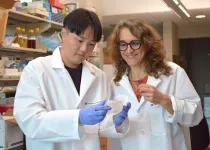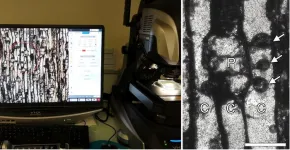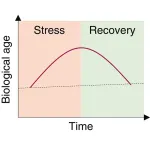(Press-News.org) A study led by the University of St Andrews suggests that a frequently used medical test for heart injury could one day be used to help COVID-19 patients avoid hospitalisation.
Cardiac troponins are proteins that form part of the heart’s contractile machinery and are released into the bloodstream when the heart is damaged. It can be measured in a blood test which is widely used in the assessment of heart attacks and other heart conditions.
Existing studies since 2020 have shown that COVID-19 patients who have elevated troponin levels are more likely to die or suffer adverse clinical outcomes compared with those who have normal troponin levels.
However, despite this evidence, cardiac troponins are still not used in clinical practice to directly risk assess COVID-19 patients and this new paper, led by the University’s Dr Alexander Liu and supervised by Dr Robert Hammond, Professor Peter Donnelly and Professor Anthony Coates, investigates the diagnostic properties of cardiac troponin and its potential to be used in mainstream clinical practice.
Dr Liu, from the School of Medicine, said: “COVID-19 is undoubtedly one of the worst pandemics of our generation. Identifying patients at a greater or lesser risk for mortality – what clinical staff call risk-stratifying patients – is important, as it may help us decide which patients need more medical attention and which patients can be discharged safely.
“Looking for heart injury is important because COVID-19 appears to have an ability to affect people’s hearts, and not just their lungs, and existing literature showed that patients with heart injury do less well in terms of prognosis than those without.
“Despite a body of evidence and potential, cardiac troponin is still not being used in clinical practice to directly risk-stratify patients with COVID-19. This study sought to ask why.”
The paper, published in the journal PLOS ONE, reports on a study of 191 patients with COVID-19, retrospectively looking at the ability of a subtype of cardiac troponin – high-sensitivity cardiac troponin T – to predict which patients suffered mortality, and which patients did not.
It found that having an elevated troponin test did not necessarily mean that the patient suffered mortality – it was inaccurate in predicting individual patient risk of death. This is most likely because, in real life, the patient population is diverse and there are factors other than heart damage which can cause elevated troponin tests. This observation may be the reason why clinicians are unable to use cardiac troponin alone to risk-stratify patients at present.
More importantly, the study also found that if a COVID-19 patient had normal cardiac troponin levels, the prognosis was very good. This is because normal troponin levels can potentially identify low-risk patients, since it may rule out complications and other illnesses that may put patients at a high risk.
Dr Liu said: “The results indicated that rather than going along with the general message in the existing literature – which is that high troponin levels are linked to poor prognosis in COVID-19 – we realised that as a diagnostic test, a high troponin level is unlikely able to accurately identify a patient at high risk of mortality. Instead, it may be better to exploit the ability of a normal troponin to rule out the risk of death in our patients.
“This study may be one small step towards clinical translation but potentially a giant leap for identifying the direction in which we need to go with COVID-19 risk-stratification. It now sets the stage for a future prospective validation of the rule-out powers of normal troponins. This could further propel the test into the COVID-19 clinical arena. The ultimate vision is to open up the possibility of using cardiac troponins to help doctors send patients home safely, to reduce their risk of hospital exposure, potentially saving lives and millions for healthcare systems.”
Dr Liu added: “This project is not just a research piece but also a product of human resilience, forged on a shared desire to make things better for our patients whilst bracing the challenges of the pandemic. This study benefited from the input of junior doctors, senior scientists, and clinicians across various disciplines and sites. It is a privilege to do research with them.”
ENDS
Notes to editors
The paper ‘Normal High-Sensitivity Cardiac Troponin For Ruling out inpatient mortality in Acute COVID-19’ is published in the journal PLOS ONE and is available online.
Please ensure that the paper’s DOI (doi.org/10.1371/journal.pone.0284523) is included in all online stories and social media posts and that PLOS ONE is credited as the source.
Issued by the University of St Andrews Communications Office.
END
Heart injury biomarker may help COVID-19 patients avoid hospitalization, new study shows
2023-04-21
ELSE PRESS RELEASES FROM THIS DATE:
Study: Cells send maintenance crews to fix damaged protein factories
2023-04-21
JUPITER, Fla. — In a discovery fundamental to the inner workings of cells, scientists have discovered that if oxidative stress damages protein factories called ribosomes, repair crews may move in to help fix the damage so work can quickly resume.
The discovery, reported Friday in the journal Molecular Cell, could have implications for cancer, the aging process, and growth and development, said the study’s lead author, molecular biologist Katrin Karbstein, Ph.D., a professor at The Herbert ...
New stellar danger to planets identified by NASA'S Chandra program
2023-04-21
CHAMPAIGN, Ill. — An exploded star can pose more risks to nearby planets than previously thought, according to a new study from NASA’s Chandra X-ray Observatory and other X-ray telescopes. This newly identified threat involves a phase of intense X-rays that can damage the atmospheres of planets up to 160 light-years away.
The results of the study, led by researchers at the University of Illinois Urbana-Champaign, Washburn University and the University of Kansas, are published in the Astrophysical Journal.
Earth is not in danger of such a threat today because there are no potential supernova progenitors within this distance, but it may have experienced ...
Why are COVID-19 vaccination rates among children so low? Parents’ worry about long-term risks, responsibility
2023-04-21
Despite efforts by the U.S. Centers for Disease Control and Prevention and pediatric clinicians to increase the COVID-19 vaccination rate among children, many remain unvaccinated due to parental concerns about the vaccine’s long-term effects and anticipated responsibility. Those are findings from a new study published in Pediatricsand conducted by the Center for Economic and Social Research(CESR) at the USC Dornsife College of Letters, Arts and Sciences.
The researchers sought to determine the causes of low child vaccination rates. Currently, only 39% of children 5 to 11 and 68% of those 12 to 17 have received ...
Insignum AgTech and Beck’s collaborate to help corn ‘talk’
2023-04-21
ATLANTA, Ind. – Insignum AgTech® and Beck’s have signed an agreement to test Insignum’s innovative corn traits in Beck’s elite varieties. The companies will collaborate to cross the trait into proprietary Beck’s genetics for field-testing in 2023 to evaluate commercial viability of the traits.
Insignum AgTech develops plant genetic traits that enable plants to “talk” and signal to farmers when specific plant stresses begin.
“With this trait, a corn plant generates purple pigment, indicating that a fungal infection has started ...
New study uncovers Colorado’s spicy ancient history of chili peppers
2023-04-21
Botanists and paleontologists, led by researchers from the University of Colorado Boulder, have identified a fossil chili pepper that may rewrite the geography and evolutionary timeline of the tomato plant family.
The team’s findings, published last month in the journal New Phytologist, show that the chili pepper tribe (Capsiceae) within the tomato, or nightshade (Solanaceae), family is much older and was much more widespread than previously thought. Scientists previously believed that chili peppers evolved in South America at most ...
360-million-year-old Irish fossil provides oldest evidence of plant self-defense in wood
2023-04-21
An international team of scientists, co-led by Dr Carla J. Harper, Assistant Professor in Botany in the School of Natural Sciences at Trinity, has discovered the oldest evidence of plant self-defence in wood in a 360-million-year-old fossil from south-eastern Ireland.
Plants can protect their wood from infection and water loss by forming special structures called “tyloses”. These prevent bacterial and fungal pathogens from getting into the heartwood of living trees and damaging it. However, it was not previously known how early in the evolution of plants woody species became capable of forming such defences.
Published ...
New paper advances understanding of geographic health disparities
2023-04-21
By looking at where people were born instead of where they ultimately move to and die, geographic disparities in mortality look different than previously assumed, according to a new study published on April 1, 2023, in the journal Demography.
interstate migration may mitigate regional inequalities in mortality according to “Understanding Geographic Disparities in Mortality,” a paper led by Jason Fletcher, professor in the La Follette School of Public Affairs at the University of Wisconsin–Madison and director of the Center for Demography of Health and Aging with an appointment in Population Health Sciences.
“At a time when nearly ...
Newly funded Morris Animal Foundation study assesses CBD use for postsurgical pain in dogs
2023-04-21
DENVER/April 21, 2023 – A new study is testing whether the addition of CBD can improve pain management in dogs following orthopedic surgery. The study, funded by Morris Animal Foundation, will be conducted by a veterinary research team at the University of Saskatchewan, Canada.
CBD use in pets has gained in popularity in the last decade, but there are few controlled studies closely examining its efficacy as a pain management tool. This study hopes to help partially close this knowledge gap.
The research team, led by Dr. Alan Chicoine, Assistant Professor, Department ...
Endocrine Society endorses bipartisan bill to address insulin affordability
2023-04-21
WASHINGTON—The Endocrine Society today endorsed the Improving Needed Safeguards for Users of Lifesaving Insulin Now (INSULIN) Act of 2023, a bipartisan insulin affordability bill introduced by Sens. Jeanne Shaheen (D-NH) and Susan Collins (R-ME). This legislation would cap out-of-pocket insulin costs for those with private insurance, ensure patients can share in insulin rebates and discounts, and promote competition in the insulin market.
These measures would protect access to life-saving insulin for more than 7 million people nationwide who rely on the medication to manage their diabetes. According to the U.S. Center for Disease Control ...
Biological age is increased by stress and restored upon recovery
2023-04-21
The biological age of humans and mice undergoes a rapid increase in response to diverse forms of stress, which is reversed following recovery from stress, according to a study publishing on April 21 in the journal Cell Metabolism. These changes occur over relatively short time periods of days or months, according to multiple independent epigenetic aging clocks.
“This finding of fluid, fluctuating, malleable age challenges the longstanding conception of a unidirectional upward trajectory of biological age over the life course,” says co-senior study author James White of Duke University School of Medicine. “Previous reports ...





